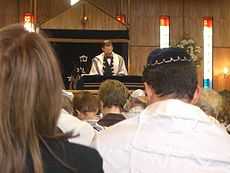Reform Judaism
| Part of a series on | |||
| Jews and Judaism | |||
|---|---|---|---|
 | |||
|
|||
|
|
|||
| |||

Reform Judaism is a phrase that refers to various beliefs, practices and organizations associated with the Reform Jewish movement in North America, the United Kingdom and elsewhere.[1] In general, Reform Judaism maintains that Judaism and Jewish traditions should be modernized and compatible with participation in the surrounding culture. This means many branches of Reform Judaism hold that Jewish law should undergo a process of critical evaluation and renewal. Traditional Jewish law is therefore often interpreted as a set of general guidelines rather than as a list of restrictions whose literal observance is required of all Jews.[2][3] Similar movements that are also occasionally called "Reform" include the Israeli Progressive Movement and its worldwide counterpart.
Reform Judaism in North America
Reform Judaism is one of the two North American denominations affiliated with the World Union for Progressive Judaism. It is the largest denomination of American Jews today.[4][5] With an estimated 1.1 million members, it also accounts for the largest number of Jews affiliated with Progressive Judaism worldwide.
Official bodies of the Reform Movement in North America include the Union for Reform Judaism, the Central Conference of American Rabbis, and Hebrew Union College-Jewish Institute of Religion.
Reform Judaism in the UK
UK Reform and Liberal Judaism are the two Progressive movements in the UK. For details on the relationship between the two progressive movements, see Progressive Judaism (United Kingdom).
Progressive Judaism in Israel
After a failed attempt in the 1930s to start an Israeli movement, the World Union for Progressive Judaism tried again in the 1970s and created the movement now known as the Israeli Progressive Movement. Because the first rabbis in the 1970s were trained in the United States, the Israeli press and public often refers to the Israeli Progressive Movement as "Reform".
Reform movement in Judaism
Along with other forms of non-orthodox Judaism, the North American Reform, UK Reform, UK Liberal Judaism and Israeli Progressive Movement can all trace their intellectual roots to the Reform movement in Judaism which emerged in nineteenth-century Germany.[6][7][8] Elements of Orthodoxy developed their cohesive identity in reaction to the Reform movement in Judaism.[7]
Although North American Reform, UK Reform, UK Liberal Judaism and Israeli Progressive Judaism all share an intellectual heritage, they occupy different positions on the non-orthodox spectrum. The North American Reform movement and UK Liberal Judaism are situated at the more radical end. The North American Conservative movement and Masorti Judaism occupy the more conservative end of the non-orthodox Judaisms, and are not regarded as forms of Reform Judaism at all. The UK Reform[9][10][11] and Israeli Progressive movements[12] come somewhere in between.
See also
- Beliefs and practices in Progressive Judaism
- Cantor in Reform Judaism
- Liberal Judaism
- Progressive Judaism
- Reform Judaism (magazine)
References
- ↑ Meyer, Michael. Response to Modernity: A History of the Reform Movement in Judaism (New York, USA: Oxford University Press, 1988), viii. "Reform Judaism" refers to a "particular position on the contemporary Jewish religious spectrum represented by a broad consensus of beliefs and practices and a set of integrated institutions. Note: in the remainder of his book Meyer is quite specific about where he uses the phrase "Reform Judaism"—it is used only in connection with the U.S. Reform (pp.227–334, 353–384) and UK Reform (p. 347) denominations.
- ↑ ReligionFacts - Reform Judaism
- ↑ What is Reform Judaism?
- ↑ Bob Abernathy, Reform Judaism, Public Broadcasting Service, May 1999.
- ↑ Matthew Wagner and Greer Fay-Cashman, Reform rabbis offended by Katsav, Jerusalem Post, June 2006.
- ↑ Louis Jacobs, The Emergence of Modern Denominationalism I: Modernization and its discontents: the Jewish Enlightenment and the emergence of the Reform movement from The Jewish Religion: A Companion, Oxford University Press, 1995. ISBN 0-19-826463-1
- ↑ 7.0 7.1 Louis Jacobs, The Emergence of Modern Denominationalism II: The development of Orthodox, Conservative, and Reconstructionist Judaism from The Jewish Religion: A Companion, Oxford University Press, 1995. ISBN 0-19-826463-1
- ↑ Meyer, Response to Modernity, viii
- ↑ URJ. "What is Progressive Judaism in Great Britain all about? What is it like to be Jewish in Great Britain? How is it different from being Jewish in North America? "
- ↑ Usenet FAQ. "How is Reform Judaism structured in the rest of the world?"
- ↑ Judaism 101:Movements of Judaism
- ↑ IMPJ. "Progressive Judaism in Israel"
External links
Official sites
- ReformJudaism.org
- Union for Reform Judaism
- RJ.org: Official news site of the Union for Reform Judaism
- World Union for Progressive Judaism
- Central Conference of American Rabbis
- Hebrew Union College Jewish Institute of Religion
Other resources
- Research and articles about Reform Judaism on the Berman Jewish Policy Archive @ NYU Wagner
- Reform Judaism FAQ on Soc.Culture.Jewish Newsgroups